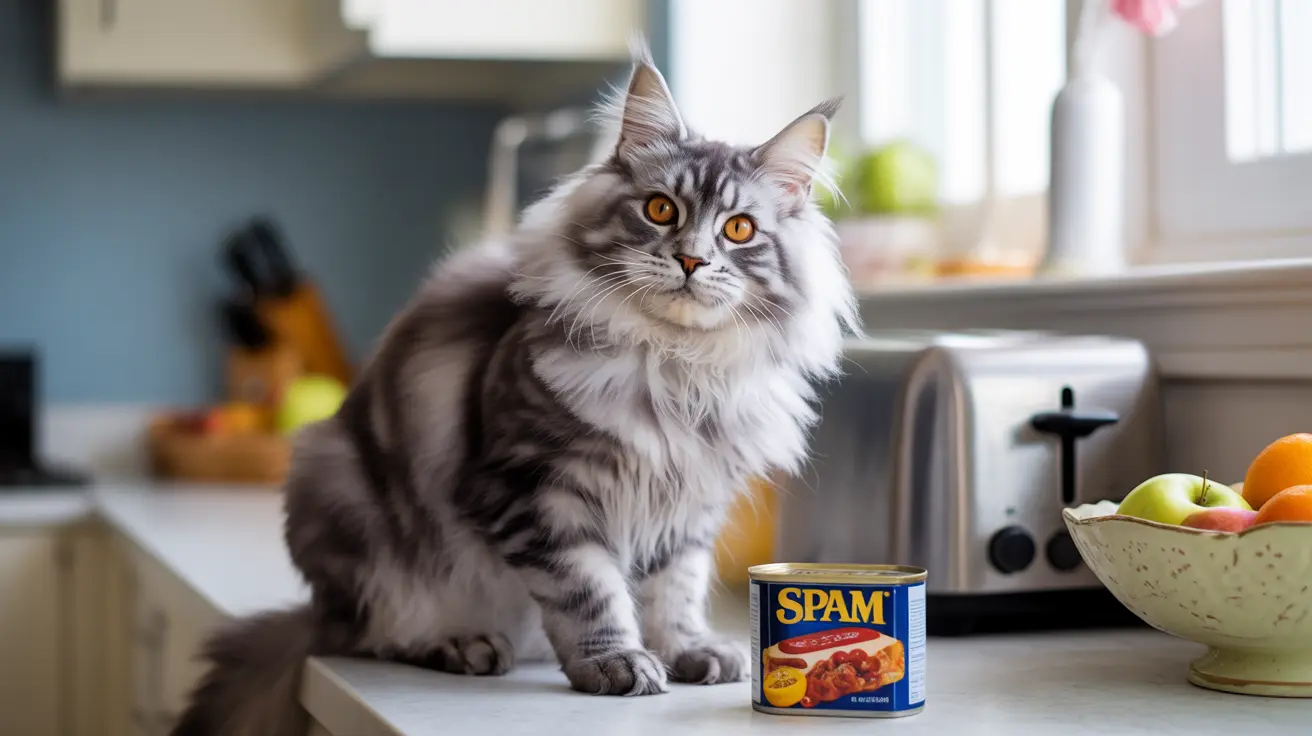If you've ever wondered whether cats can eat Spam, the answer is clear: while cats might be attracted to this processed meat product, feeding Spam to your feline friend is not safe or recommended. As a responsible pet owner, it's crucial to understand why this popular canned meat could pose serious health risks to your cat.
Let's explore the dangers of feeding Spam to cats and discover safer alternatives for treating your furry companion.
Understanding Why Spam Is Harmful to Cats
Spam contains several ingredients that make it particularly dangerous for feline consumption. The high sodium content, excessive fat, and various preservatives can lead to both immediate and long-term health issues in cats.
Dangerous Ingredients in Spam
A single serving of Spam contains:
- 790mg of sodium (nearly 20 times a cat's daily requirement)
- 16g of fat (triple the recommended daily intake)
- Modified potato starch
- Sodium nitrite and other preservatives
- Added sugars and artificial flavorings
Health Risks for Cats Who Eat Spam
Immediate Health Concerns
When cats consume Spam, they may experience several acute symptoms:
- Excessive thirst and urination
- Vomiting and diarrhea
- Lethargy and weakness
- Digestive upset
- Dehydration
Long-term Health Complications
Regular consumption of Spam can lead to serious health issues:
- Obesity and diabetes
- Kidney problems from excess sodium
- Pancreatitis from high fat content
- Nutritional deficiencies
- Cardiovascular issues
Safe Alternatives to Spam for Cats
Instead of Spam, consider these healthy options for treating your cat:
- Small pieces of plain, cooked chicken
- Lean, unseasoned turkey
- Commercial cat treats formulated for feline nutrition
- Fresh, cooked fish (occasional treat)
What to Do If Your Cat Eats Spam
If your cat accidentally consumes Spam, take these steps:
- Monitor their behavior closely
- Ensure fresh water is readily available
- Watch for concerning symptoms
- Contact your veterinarian if symptoms appear or if large amounts were consumed
Frequently Asked Questions
Is it safe for cats to eat Spam even in small amounts?
No, even small amounts of Spam can be harmful to cats due to its extremely high sodium content and preservatives. While a tiny taste might not cause immediate harm, it's best to avoid feeding Spam to cats entirely.
What health risks can Spam cause if fed regularly to cats?
Regular Spam consumption can lead to obesity, diabetes, kidney problems, salt toxicity, pancreatitis, and other serious health issues. The high sodium and fat content make it particularly dangerous for long-term consumption.
What symptoms should I watch for if my cat accidentally eats Spam?
Monitor your cat for excessive thirst, frequent urination, vomiting, diarrhea, lethargy, and loss of appetite. If these symptoms occur, contact your veterinarian immediately.
Are there healthier meat treat alternatives to Spam for cats?
Yes, safer alternatives include small pieces of plain cooked chicken, turkey, or fish. Always ensure treats are unseasoned and make up no more than 10% of your cat's daily caloric intake.
Why is Spam nutritionally unsuitable for a cat's diet?
Spam lacks essential nutrients cats need, contains excessive sodium and fat, and includes preservatives that can be harmful to cats. Cats require a balanced diet specifically formulated for their nutritional needs, which Spam cannot provide.
Remember, while it might be tempting to share human foods with your feline friend, sticking to veterinarian-approved cat food and treats is the safest way to keep your cat healthy and happy.






